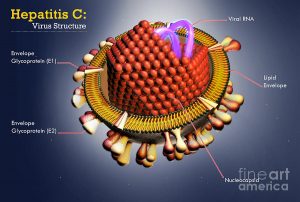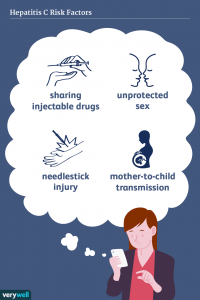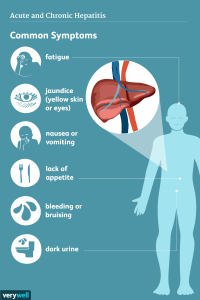Summary
Hepatitis C is an infection, occurring in the liver, that originates from the Hepatitis C Virus. Due to the many forms of the infection and mild symptoms, many people are unaware that they carry the virus. It is believed that as many as 3.9 million people are infected with Hepatitis C in the United States, with transmission through blood. Although Hepatitis C can be cured, it often stays in the host long enough to evolve into a chronic disease, resulting in liver cancer and other liver diseases.
Pictures
Structure of Hepatitis C Virus (Pictured above)
Hepatitis C Transmission (Pictured above)
Hepatitis C Symptoms (Pictured above)
Transmission
Hepatitis C can be only be transmitted through blood. Although it may seem like there is a small chance Hepatitis C could be transmitted, it is believed that nearly 3.9 million individuals in the United States have been infected with the virus. For an individual to be infected, they must come in contact with infected blood and it must enter their system. For example, sharing drug needles and syringes with other users may increase your risk of obtaining Hepatitis C. Blood transfusions may also infect a person if the blood used was already infected. Moreover, although it is rare, unprotected sex may spread the Hepatitis C Virus between individuals if any tissue is torn during intercourse.
Symptoms & Side Effects
Hepatitis C Virus usually goes undetected in many individuals that obtain the virus. However, the virus has two stages, Acute Hepatitis C & Chronic Hepatitis C.
Acute Hepatitis C
Acute Hepatitis C is when an individual is first infected with the virus. Although most people do have any symptoms at all, some people may experience flu like symptoms, such as:
- Fatigue
- Fever
- Stomach pain
- Nausea
- Jaundice
Because the symptoms are generalized during this stage, many individuals are not aware that they are infected with the Hepatitis C Virus. Symptom onset ranges between 2-12 weeks, however, as previously mentioned, many have no symptoms at all.
Chronic Hepatitis C
Chronic Hepatitis C occurs when an individual that carries the Hepatitis C Virus, does not receive any treatment for the virus, usually due to the fact that they are unaware they are a carrier. Chronic Hepatitis C comes with more severe symptoms and side effects, such as:
- Weight Loss
- Swollen Legs
- Itchy Skin
- Easily Bruising
- Cirrhosis
If the virus goes untreated, it may result in diseases such as Liver Cancer that are fatal. Another common occurrence is Cirrhosis, the scarring of liver tissue, however this is usually not present until an individual has carried the virus for 20-30 years. The risk of dying from Hepatitis C is low if a person is receiving proper treatment and catches the virus when action can still be taken.
Treatment
Treating Hepatitis C can be tricky, however, if all is successful, an individual can be cured from the virus. Previous treatments required an infected individual to be injected with medication that pushes your immune system into override, in hopes that it will eradicate the virus. Unfortunately, this method has around a 50% success rate and bad symptoms usually accompany the treatment. However, due to progresses in science, many people can eradicate the virus by simply taking an antiviral pill at home until the virus is killed off. This medication is usually taken for 12 weeks and followed up with a blood test from your doctor to see if the virus is still present. Treating Hepatitis C is important, especially due to the fact that it is the number one cause of liver cancer.


